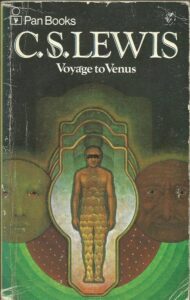
To say this book was over-rated would be a vast under-statement. As a huge fan of more modern sci fi books, and having grown up reading whatever sci fi I could find in my local charity shop, I envied those who had access to works from classic sci fi writers such as C.S. Lewis. So, naturally, when I picked this book up to read it I was excited to get stuck in and enjoy a classic.
That was, if I could get past the 40 page mark – which I unfortunately didn’t. With so many books out there to explore, it feels disingenuous to commit to reading a full length work if it does very little to capture your interest in it’s first chapter – let alone the first 40 pages.
WhAT I Liked About Voyage To Venus
While it wouldn’t be in the best of practice to judge the full book, considering I read a fraction of it, from what I did read there was some good worth mentioning. Where C.S. Lewis shines in this book is his ability to vividly describe to the reader the scenery of what he imagines, what he wants to describe, and how he wants to describe it.
Whether its the strange ocean-like surface that one of our main characters wakes up in, or the potent description of emotions our characters experience – his strength is absolutely in his ability to describe.
Another attribute of the first 40 pages that I enjoyed was the creativity and idea around alien life on a macroscopic scale – that our solar system is but a realm of a much bigger, larger, and almost unimaginable plain of reality. How this subject, the alien life forms, and the general idea of macroscopic life is approached is unique, thought provoking, and distinct enough that it captured my interest through till that 40 page mark.
However the book suffers from a;
Terribly Slow plot
Despite what I enjoyed about the novel, ideas can only carry a book so far. The pacing of the book, the plot, and even the individual scenes themselves was painstakingly slow to put it mildly. While the plot and how it is presenting through a first person view makes for a good read – and helps to connect the reader to the story – how the story progressed was far too sluggish.
In part, C.S. Lewis’ strength and power of descriptive discourse was likely what led the novel astray in my own eyes. The detail and length to which ideas, concepts, scenes, people, and experiences were described kept the pacing of the plot at a very slow drudge.
While I do commend his ability to build and weave a mysterious plot with obscure forward momentum, this combined with the slow pacing made me feel like the plot had progressed very little in the 40 or so pages I read through.
And, to be honest, I didn’t care to keep on reading. The ideas presented in the book – while they were original and interesting – didn’t extend my interest beyond that 40 page mark. I didn’t really want to find out much more and my interest faded after surpassing the 30 page mark.
I am sure it is a great book, and if you like slow burns, then this is certainly the book for you!
A Complication of Genre
While my opinion has been fairly surface level and short, it has been written this way be design. Having only read 40 pages, I can only assess what i’ve read and what I feel about what I’ve read. From this, the only other thing I wanted to briefly touch on was the complication of genre. Granted, this book is decades old and in today’s modern age literary theory has come leaps and bounds since C.S. Lewis’ time.
Nevertheless, I feel that this book straddles the line between science fiction and science fantasy – but in a way that blurs genre conventions in a misdirected fashion. For instance, there’s very little reference as to any hard sic fi tropes or technology and the explanations we receive in canon are very superficial in that they skirt over any ‘science’ involved.
I think this is certainly a good, early example of the science and fantasy genres crossing over – even if it wasn’t intended. But, who knows? Maybe it was!
Take This With A Pinch Of Salt
Of course, almost needless to say, i’m no C.S. Lewis and everything i’ve said is to be taken with a (massive) pinch of salt. I like and dislike things I like and dislike – just like everyone else. I’d certainly recommend you give this book a whirl, as it has some interesting concepts to get stuck into. Just, beware of its pacing and take note that it’s closer to science fantasy than science fiction.
Read More From Lore
This science fiction book review was written by Stewart, the founder of Lore, based in Glasgow, Scotland. Stewart is an avid fan of science fiction, cosmic horror, science fantasy, and has recently started dabbling in high fantasy reading to pad out his drive for original, fantastic tales to delve into.
Be sure to:
- Check out Lore’s Blog for more reviews and articles; such as our article on how to write a time skip in fiction.
- Take a look at our sci fi flash fiction and sci fi short stories
- Or, if you want to browse our full selection, check out our short fiction depository
- Looking for more book reviews? Why not read Stewart’s review of The Ballad of Beta-2
